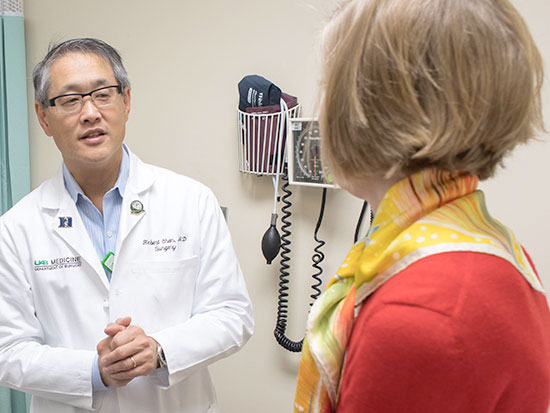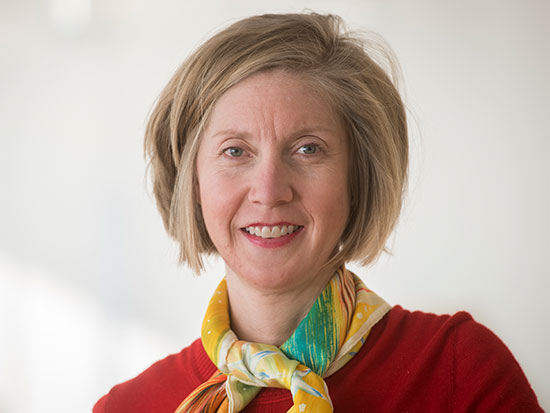 Herb Chen, M.D., removed Cain's cancerous nodule Jan. 8, 2018, by performing a total thyroidectomy.Ragan Cain will never forget the day she received her cancer diagnosis.
Herb Chen, M.D., removed Cain's cancerous nodule Jan. 8, 2018, by performing a total thyroidectomy.Ragan Cain will never forget the day she received her cancer diagnosis.
In 2010, she was seeking fertility treatment at a Birmingham hospital. Her physician performed a typical physical exam and while checking her neck noticed a nodule on Cain’s thyroid. She was referred to an endocrinologist who biopsied the nodule and diagnosed the nodule as benign. She was examined every year after that with the same diagnosis.
During this routine check in 2017, her physician said the nodule felt a little different.
“That’s when I decided to get proactive about my health,” Cain said.
Cain, an Alabama native and chief administrative officer for Tacala, LLC, made the decision to get a second opinion with UAB Medicine, where she was seen by Brooks Vaughan, M.D., assistant professor in the Division of Endocrinology, Diabetes and Metabolism.
“We went back and forth about what we should do,” Cain said. “The nodule was small, and an original benign biopsy created a strange set of circumstances. After much discussion, Dr. Vaughn and I agreed to have his team at UAB re-biopsy the nodule.
Vaughan’s team performed a fine-needle biopsy Dec. 19, 2017. Results were expected after Christmas, but Cain received the call on Dec. 21.
“I knew when I saw that phone number, something was wrong,” Cain said.
She was diagnosed with papillary thyroid cancer, which is the most common type of thyroid cancer. It makes up nearly 80 percent of all cases of thyroid cancer and is one of the fastest-growing cancer types, with more 20,000 new cases a year. Although a person can get papillary thyroid cancer at any age, most patients will present before the age of 40. It is also the thyroid cancer with the best prognosis, and most patients can be cured if treated appropriately and early enough.
 "I felt strongly that it was important to receive this treatment at UAB. They have taken this diagnosis seriously and treated me with great care, concern and reassurance." “When you’re 40 years old and eat healthy and do the right things, you think you have pretty good health,” Cain said. “It was a big surprise, as I know it is to everyone who receives a cancer diagnosis. I spent the days following feeling like I was in a fog.”
"I felt strongly that it was important to receive this treatment at UAB. They have taken this diagnosis seriously and treated me with great care, concern and reassurance." “When you’re 40 years old and eat healthy and do the right things, you think you have pretty good health,” Cain said. “It was a big surprise, as I know it is to everyone who receives a cancer diagnosis. I spent the days following feeling like I was in a fog.”
After receiving her diagnosis, Cain was able to schedule an appointment the following day with Herb Chen, M.D., Fay Fletcher Kerner Endowed Chair in the Department of Surgery.
“Dr. Chen came highly recommended to me, and he just helped to ease my mind,” she said.
Chen removed the nodule Jan. 8, 2018, by performing a total thyroidectomy — the complete removal of the thyroid gland. Chen, a senior adviser in the UAB Comprehensive Cancer Center and president-elect of the American Association of Endocrine Surgeons, says UAB is a highly sought-after destination for thyroid surgeries.
“We are a high-volume surgery center,” Chen said. “Our endocrine surgeons are internationally known and have the experience to treat all types of thyroid and parathyroid disease.”
Two weeks after the procedure, Cain returned for a checkup and received good news. However, she still wonders if some of the fear and anger she put on herself might have been non-existent if she had made the decision to get her nodule further examined sooner. Because of this experience, she is now an advocate for others’ being proactive about their health.
“I was of course afraid when I received the diagnosis,” she said, “and I thought that I was doing the right thing by having my thyroid checked every year; but clearly I didn’t take it seriously enough. I was angry at myself for waiting so long. It was a reminder of what I already knew, but I finally applied it to myself. Dr. Ed Partridge of the UAB Comprehensive Cancer Center is known to have said, ‘Treat your first cancer seriously, and you may not have to deal with more down the road.’ I felt strongly that it was important to receive this treatment at UAB. They have taken this diagnosis seriously and treated me with great care, concern and reassurance.”
